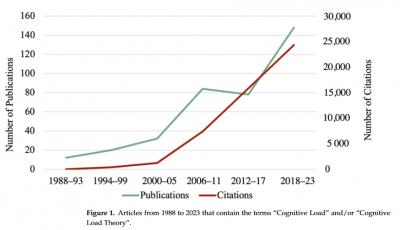It's hard to know what to make of this article (8 page PDF). Two major points are made. The first is that cognitive load theory is diverging from the rest of educational psychology (edpsych) in that while edpsych "employed mostly observational methods, all but two of the CLT articles employed experimental or intervention designs." The second is that the "failure of experiments to replicate helped cognitive load theory to expand with the identification of boundary conditions" prompting proponent John Sweller to remark, "Cognitive load theory's continual adaptation to new data is one of its primary virtues." The authors assert "Randomized control trials have long been considered the gold standard and are the ideal design for establishing causality and making recommendations for practice" but with the entire field moving in a different direction one wonders whether this continues to be true. Proving cause and effect in complex environments is tendentious at best, and when theories simply adapt to disconfirming data, one wonders whether they are provable at all.
Today: 0 Total: 440 [] [Share]




